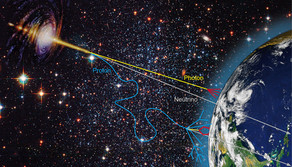Data, Theories, and Scientific Explanation:
The Case of Astroparticle Physics
In an interdisciplinary co-operation between philosophy and physics, we investigate the methods and explanatory power of astroparticle physics (APP) as an example of current scientific practice. Focusing on methods of computer simulation and machine learning, we address the epistemological questions of data analysis as well as the probabilistic and causal-mechanistic explanations of APP.
APP bridges the gaps between astrophysics, cosmology, and particle physics. It registers cosmic rays using systems of particle detectors that function as telescopes for measuring subatomic particles of extraterrestrial origin. The aim of APP is to determine the origin of this radiation and explain its physical properties – its high energy and the mechanisms of its creation and acceleration. The physical explanation is based on astrophysical models of the radiation sources (supernovae, active galactic nuclei, etc.), nuclear physics models of particle emission, and plasma physics, etc., to explain the acceleration of the emitted charged particles. The primary particles give rise to secondary particles such as neutrinos, which propagate to Earth without being scattered by interstellar gas or deflected by intergalactic magnetic fields; their production and measurement is subject to particle physics. APP thus mediates between the data and several physical theories underlying the disparate standard models of particle physics and cosmology.
APP thus brings together many problems that characterise science today and are currently discussed in the philosophy of science: the influence of computer simulations and machine learning on the data; the opacity of machine learning and its epistemic significance; incoherent foundations of modelling; probabilistic and causal-mechanistic explanations; the inductive inference from phenomena to their causes. In this project, we analyse the data analysis of APP, including the role of computer simulations and machine learning, with respect to its probabilistic character and the epistemic significance of its opacity, to compare them with the corresponding methods of particle physics and radio astronomy. We focus on the innovative probabilistic character of the machine learning methods used for data analysis in recent APP. In addition, we analyse the heuristic concept of messenger particles (which is crucial for the causal-mechanistic explanations of APP) and discuss it in the context of recent measurement results. The project will also shed new light on the philosophical question of the extent to which physical theories and theory-dependent data can be interpreted in realistic terms.
Workshop "From Raw Data to Measurement Results – Epistemological Problems in Data Analysis"
In this interdisciplinary workshop we will discuss the epistemological questions concerning measurement, data analysis and computer simulations in contemporary physics. The workshop will take place on November 13 and 14, 2025 at the Lamarr Institute at the Technical University of Dortmund. Information about the workshop can be found at: https://events.lamarr-institute.org/event/244/
Project members
- Prof. Dr. Dr. Brigitte Falkenburg
- Dr. Dominik Martin Elsässer
- Dr. Johannes Mierau
- Prof. Dr. Dr. Wolfgang Rhode
Funding: Deutsche Forschungsgesellschaft (German Research Foundation)

![[Translate to English:] [Translate to English:]](/storages/app-physik/_processed_/3/a/csm_APPGroupphoto2023_001_small_858e4405eb.jpg)



